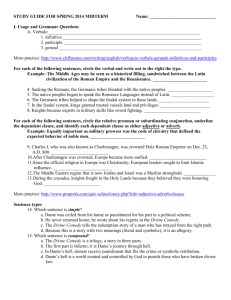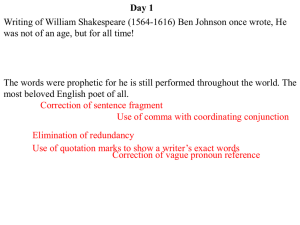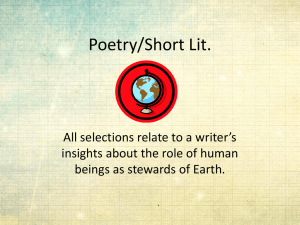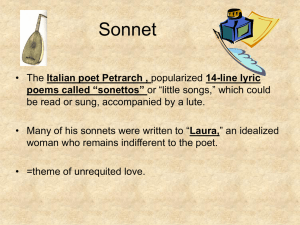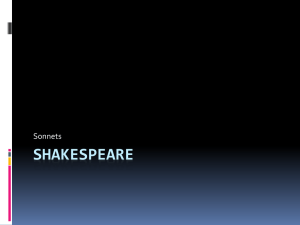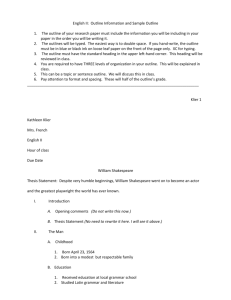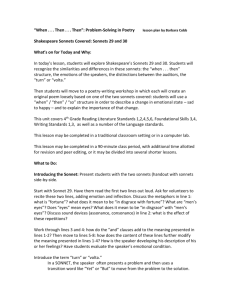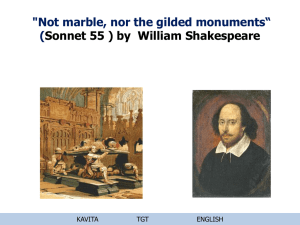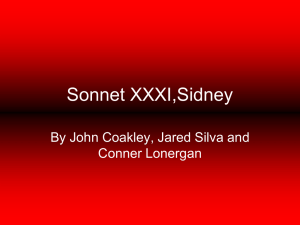Hauptseminar "Derek Walcott: A Selection of his Works", Winter Sem
advertisement
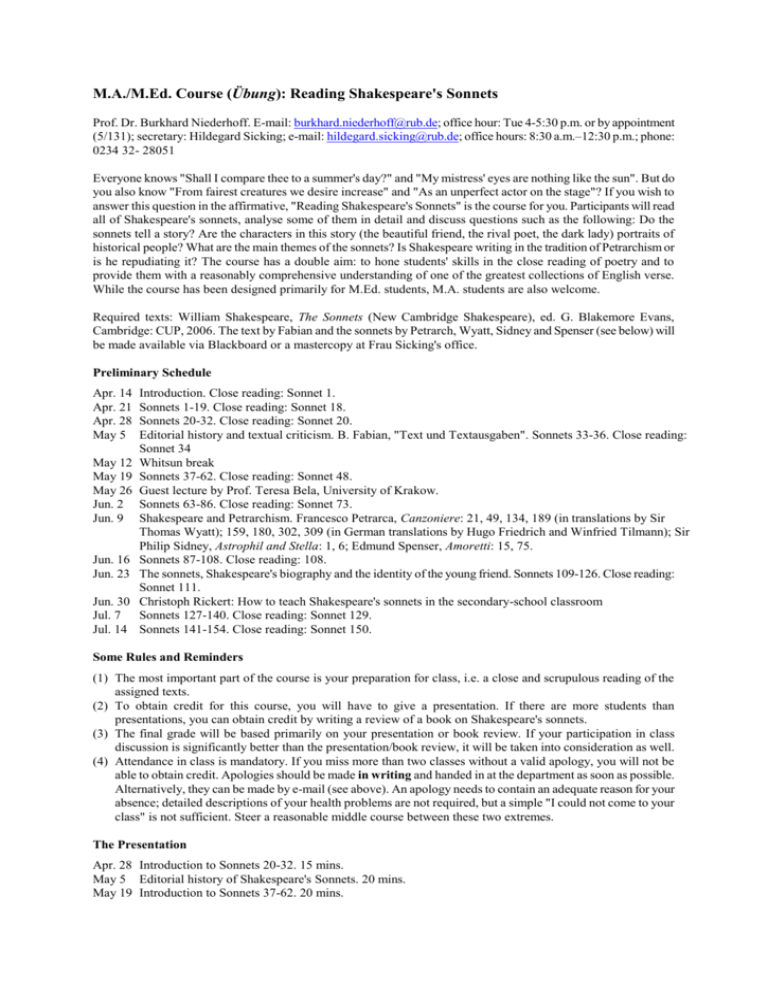
M.A./M.Ed. Course (Übung): Reading Shakespeare's Sonnets Prof. Dr. Burkhard Niederhoff. E-mail: burkhard.niederhoff@rub.de; office hour: Tue 4-5:30 p.m. or by appointment (5/131); secretary: Hildegard Sicking; e-mail: hildegard.sicking@rub.de; office hours: 8:30 a.m.–12:30 p.m.; phone: 0234 32- 28051 Everyone knows "Shall I compare thee to a summer's day?" and "My mistress' eyes are nothing like the sun". But do you also know "From fairest creatures we desire increase" and "As an unperfect actor on the stage"? If you wish to answer this question in the affirmative, "Reading Shakespeare's Sonnets" is the course for you. Participants will read all of Shakespeare's sonnets, analyse some of them in detail and discuss questions such as the following: Do the sonnets tell a story? Are the characters in this story (the beautiful friend, the rival poet, the dark lady) portraits of historical people? What are the main themes of the sonnets? Is Shakespeare writing in the tradition of Petrarchism or is he repudiating it? The course has a double aim: to hone students' skills in the close reading of poetry and to provide them with a reasonably comprehensive understanding of one of the greatest collections of English verse. While the course has been designed primarily for M.Ed. students, M.A. students are also welcome. Required texts: William Shakespeare, The Sonnets (New Cambridge Shakespeare), ed. G. Blakemore Evans, Cambridge: CUP, 2006. The text by Fabian and the sonnets by Petrarch, Wyatt, Sidney and Spenser (see below) will be made available via Blackboard or a mastercopy at Frau Sicking's office. Preliminary Schedule Apr. 14 Apr. 21 Apr. 28 May 5 May 12 May 19 May 26 Jun. 2 Jun. 9 Jun. 16 Jun. 23 Jun. 30 Jul. 7 Jul. 14 Introduction. Close reading: Sonnet 1. Sonnets 1-19. Close reading: Sonnet 18. Sonnets 20-32. Close reading: Sonnet 20. Editorial history and textual criticism. B. Fabian, "Text und Textausgaben". Sonnets 33-36. Close reading: Sonnet 34 Whitsun break Sonnets 37-62. Close reading: Sonnet 48. Guest lecture by Prof. Teresa Bela, University of Krakow. Sonnets 63-86. Close reading: Sonnet 73. Shakespeare and Petrarchism. Francesco Petrarca, Canzoniere: 21, 49, 134, 189 (in translations by Sir Thomas Wyatt); 159, 180, 302, 309 (in German translations by Hugo Friedrich and Winfried Tilmann); Sir Philip Sidney, Astrophil and Stella: 1, 6; Edmund Spenser, Amoretti: 15, 75. Sonnets 87-108. Close reading: 108. The sonnets, Shakespeare's biography and the identity of the young friend. Sonnets 109-126. Close reading: Sonnet 111. Christoph Rickert: How to teach Shakespeare's sonnets in the secondary-school classroom Sonnets 127-140. Close reading: Sonnet 129. Sonnets 141-154. Close reading: Sonnet 150. Some Rules and Reminders (1) The most important part of the course is your preparation for class, i.e. a close and scrupulous reading of the assigned texts. (2) To obtain credit for this course, you will have to give a presentation. If there are more students than presentations, you can obtain credit by writing a review of a book on Shakespeare's sonnets. (3) The final grade will be based primarily on your presentation or book review. If your participation in class discussion is significantly better than the presentation/book review, it will be taken into consideration as well. (4) Attendance in class is mandatory. If you miss more than two classes without a valid apology, you will not be able to obtain credit. Apologies should be made in writing and handed in at the department as soon as possible. Alternatively, they can be made by e-mail (see above). An apology needs to contain an adequate reason for your absence; detailed descriptions of your health problems are not required, but a simple "I could not come to your class" is not sufficient. Steer a reasonable middle course between these two extremes. The Presentation Apr. 28 Introduction to Sonnets 20-32. 15 mins. May 5 Editorial history of Shakespeare's Sonnets. 20 mins. May 19 Introduction to Sonnets 37-62. 20 mins. 2 Jun. 2 Jun. 9 Jun. 16 Jun. 23 Introduction to Sonnets 63-86. 20 mins. Biography of Francesco Petrarca. 15 mins. Introduction to Sonnets 87-108. 20 mins. Biography of William Shakespeare. 15 mins. Identity of the young friend. 15 mins. Jul. 7 Introduction to Sonnets 127-140. 15 mins. Jul. 14 Introduction to Sonnets 141-154. 15 mins. (1) Read the general guidelines on presentations on my website. (2) Do not exceed the time limits given above. I will cut you off when you have used up your time. ("And nothing 'gainst Time's scythe can make defence" [Sonnet 12]). (3) Those who give an introduction to a series of sonnets should give an overview with a focus on theme and content indicate groups of sonnets that are connected in narrative or thematic terms indicate links to previous sonnets (or later ones) use a few pithy quotations not go into detail about the sonnet selected for close reading I will give an introduction to sonnets 1-19 on April 21. This will give you an idea of what you are supposed to do. If you have any questions, come and see me in my office hour (or after the course). (4) Those who give presentations on other topics (biography, editorial history ...) should consult me at least two weeks before their presentation. The Book Review (1) Select a book on Shakespeare's sonnets by June 24 and let me know about your choice. You need my approval of your choice before you go ahead. (2) The review should be about four pages long. It should contain an introduction (about half a page) a summary of the argument (about two and a half pages) an evaluation of the argument (about one page) (3) Please follow the departmental style sheet. However, title page and contents page are not necessary. Put the bibliographical entry for the book you are reviewing at the top of your first page. (4) If I catch you stealing somebody else's words or ideas, you will not pass the course. There will be no rewriting options or second chances in this case. Please append the so-called "honesty declaration". (5) The deadline for the book reviews is August 14. E-mail submissions will not be accepted; you need to hand in a printout. Your grade will go down by one third of a grade (e.g. from 2 to 2,3) for each weekday that your book review is late. Bibliography a) Reference Works Campbell, Oscar James, ed. A Shakespeare Encyclopaedia. London: Methuen, 1966. Onions, C.T. A Shakespeare Glossary. Oxford: Clarendon Press, 1988. Schabert, Ina ed. Shakespeare-Handbuch: Die Zeit, der Mensch, das Werk, die Nachwelt. Stuttgart: Kröner, 1992. Simpson, John A., and E.S.C. Weiner, eds. The Oxford English Dictionary. 2nd ed. Oxford: Clarendon P, 1989. Also available online on the UB website. b) editions Shakespeare's Sonnets. Ed. Stephen Booth. New Haven: Yale UP, 1978. The Sonnets and A Lover's Complaint. Ed. John Kerrigan. Harmondsworth: Penguin, 1986. Shakespeare's Sonnets. Ed. Katherine Duncan-Jones. The Arden Shakespeare. London: Nelson, 1997. A New Variorum Edition of Shakespeare: The Sonnets. 2 vols. Ed. Hyder Edward Rollins. Philadelphia, Penn: Lippincott, 1944. c) criticism Jones, Peter ed. Shakespeare: The Sonnets, A Casebook. London: Macmillan, 1977. Vendler, Helen. The Art of Shakespeare's Sonnets. Cambridge: Belknap Press of Harvard UP, 1997.

